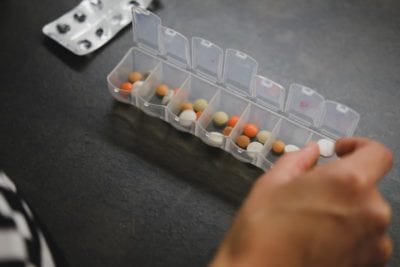
KEY POINTS:
- A recent study shows that one pill a day used in conjunction with insulin may help reduce HbA1c levels by as much as 0.32% after 12 weeks.
- The pill TTP399, activates glucokinase in the liver. This stimulates the body to improve glucose utilization which lowers blood glucose levels.
- TTP399 could be used in conjunction with insulin therapy as a way of further managing and reducing HbA1c levels.
- Diabetes Research Connection is interested to see how it evolves moving forward, and what it could mean for the future of oral treatment involving noninsulin products.
To know more, please read the article below.
Keeping HbA1c levels within a healthy range can be challenging for those living with type 1 diabetes. It requires constant vigilance when it comes to monitoring blood sugar levels and administering the appropriate amount of insulin. Even with careful management, there can be complications.
A recent study found that a once-daily pill used in conjunction with insulin may help reduce HbA1c levels by as much as 0.32% after 12 weeks. The pill, known as TTP399, activates glucokinase in the liver. This, in turn, stimulates the body to improve glucose utilization which can lead to lower blood glucose levels. Overall, this could help improve HbA1c levels as well as time spent within a healthy glucose range.
A randomized, double-blind, adaptive study compared participants taking the TTP399 pill versus those on a placebo. Those who received the pill showed improved glucose response and fewer symptomatic hypoglycemic episodes. The average improvement in HbA1c was 0.21%, and there was also an average of an 11% reduction in the dosage amount of total daily mealtime bolus insulin needed.
On the other hand, the placebo group showed a 0.11% increase in HbA1c after the 12-week trial period. Neither group reported any incidences of diabetic ketoacidosis, and there was only one incident of severe hypoglycemia, which occurred in the placebo group.
This phase 2 study involved 85 participants. They were all currently either administering daily injections or using an insulin pump. If they were using a continuous glucose monitor (CGM), they had to be on it for at least three months prior to the start of the study to be included.
According to Steve Holcomb, president and CEO of vTv Therapeutics, “Consistent with FDA guidance, a 0.3% improvement in HbA1c is considered clinically meaningful and coupled with the well-controlled population of patients and favorable safety data from our clinical trials to date, this provides a strong basis for moving this potential first-in-class program forward.”
The pill could be used in conjunction with insulin therapy as a way of further managing and reducing HbA1c levels. This an exciting step forward in terms of type 1 diabetes management and supporting individuals in staying within healthy ranges for HbA1c and daily blood sugar levels.
Diabetes Research Connection (DRC), though not involved with this study, is interested to see how it evolves moving forward, and what it could mean for the future of oral treatment involving noninsulin products.
Research for type 1 diabetes continues to improve and advance every single day, and DRC helps makes this possible by providing critical funding to early-career scientists pursuing novel research studies on type 1 diabetes. Through generous donations from individuals, corporations, and foundations, they are able to provide researchers with up to $50K in funding to support studies aimed at improving prevention measures, enhancing quality of life, reducing complications, and finding a cure.
The source: https://diabetesresearchconnection.org/
